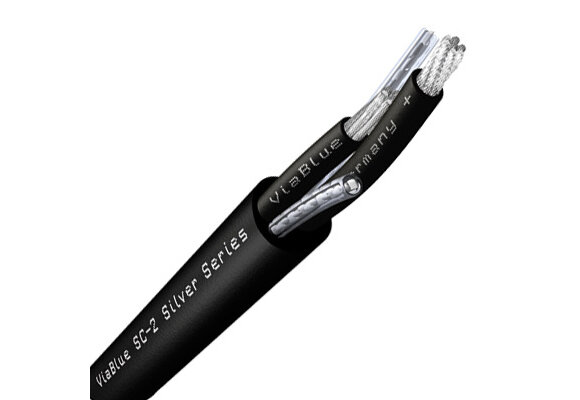Loudspeaker cables are probably one of the most discussed topics in the loudspeaker scene. Some see loudspeaker cables as a science and are willing to invest several hundred euros in speaker cables. Others believe there is no (audible) difference between a €5 cable and a €500 cable. But who is right? In the end, everyone has to answer this question for themselves. Nevertheless, there are differences in quality in the cable world that should be considered when choosing a suitable cable.
Here at SoundImports, you will find speaker cables in various diameters by the metre from our quality brands ICC and QED.
What should I consider when buying a speaker cable?
When resistance exceeds 5% of the speaker's impedance, resistance impacts the speaker's performance. The wire length and cross-sectional area of the wire have an impact on resistance. The shorter the speaker cable is, the less resistance it will have. The goal is to keep wire lengths as short as possible while ensuring that your speakers are spaced apart. To ensure that both speakers have equivalent impedance values, the wire lengths to both speakers must be the same.
For longer wires, high-power amplifiers, and low-impedance speakers (4 or 6 ohms), thick wire (2,5mm² and above) is recommended. 1,5mm² or thinner wire will usually suffice for relatively short lines (less than 15m) to 8 ohm speakers. It is both cost-effective and simple to use.
Run a rope or measure tape from your receiver or amplifier to each speaker placement to determine how much speaker wire you need. Add a few centimetres to the length of the rope (to provide some slack for easier connection to your gear).
Due to its low resistance and lower costs compared to other materials, copper is the most commonly used material for speaker cable. When pure copper is exposed to air, it reacts to form copper oxide, forming a barrier between the speaker/amplifier and the cable, potentially weakening the connection. Since copper does oxidise, it needs to be insulated and well protected with a thick cover.
Note: Look closely at the description of the wire you might be interested in. Some cables are "copper-clad aluminium (CCA)", some are "oxygen-free copper (OFC)". For the best result, you should choose oxygen-free copper (OFC) wires. Therefore, we only offer oxygen-free copper (OFC) wires here at SoundImports.
Do I need additional connectors for speaker wires?
This depends on your type of speaker. Spring clips and binding posts are the two types of speaker wire connectors found on speakers. Spring clips are a simple tool to work with. Simply press the clip down, insert the speaker cable, and let go. The wire is held in place by a spring-loaded system. Bare wire and pin connectors are supported by spring clip terminals, however spade connectors, banana plugs, and dual-banana plugs are not.
Binding posts are a great way to attach your speaker cable. Unscrew the collar to disclose the hole where bare wire and pin connectors are connected. As a result, banana plugs and spade connectors are not required, and they are convenient when speakers are frequently attached and detached. They also look fantastic on binding posts, which gives your speakers a more "professional" and "clean" look. Banana and dual banana plugs go straight into the centre hole of a binding post. When you screw the collar back down, a spade connector glides around it and secures it.

 Home audio
Home audio  Audio components
Audio components  Crossover components
Crossover components  Test & measurement
Test & measurement  DIY kits
DIY kits  Accessories
Accessories  New products
New products  Speakers
Speakers Amplifiers
Amplifiers DAC converters
DAC converters DSP modules
DSP modules Turntables
Turntables Streamers
Streamers Woofers
Woofers Tweeters
Tweeters Exciters
Exciters Bass shakers
Bass shakers Plate amplifiers
Plate amplifiers Amplifier modules
Amplifier modules Single board computers
Single board computers Assembled crossovers
Assembled crossovers Printed Circuit Boards (PCB)
Printed Circuit Boards (PCB) Capacitors
Capacitors Resistors
Resistors Coils
Coils Circuit Breakers
Circuit Breakers Crossover tools
Crossover tools Screw terminals
Screw terminals Acoustic measurements
Acoustic measurements Electric measurements
Electric measurements Sound level meters
Sound level meters DIY amplifier kits
DIY amplifier kits DIY component packs
DIY component packs DIY speaker kit
DIY speaker kit DIY subwoofer kits
DIY subwoofer kits DIY bluetooth speaker
DIY bluetooth speaker DIY electronics kits
DIY electronics kits Binding posts
Binding posts Cabinet Hardware
Cabinet Hardware Cables
Cables Connectors
Connectors Speaker cabinets
Speaker cabinets Electromechanics
Electromechanics Power supplies
Power supplies Speaker repair
Speaker repair Workshop & tools
Workshop & tools Amplifier accessories
Amplifier accessories Stands & mounts
Stands & mounts Gift voucher
Gift voucher Books
Books New products
New products









 Speakers
Speakers Amplifiers
Amplifiers DAC converters
DAC converters DSP modules
DSP modules Turntables
Turntables Streamers
Streamers Woofers
Woofers Tweeters
Tweeters Exciters
Exciters Bass shakers
Bass shakers Plate amplifiers
Plate amplifiers Amplifier modules
Amplifier modules Single board computers
Single board computers Assembled crossovers
Assembled crossovers Printed Circuit Boards (PCB)
Printed Circuit Boards (PCB) Capacitors
Capacitors Resistors
Resistors Coils
Coils Circuit Breakers
Circuit Breakers Crossover tools
Crossover tools Screw terminals
Screw terminals Acoustic measurements
Acoustic measurements Electric measurements
Electric measurements Sound level meters
Sound level meters DIY amplifier kits
DIY amplifier kits DIY component packs
DIY component packs DIY speaker kit
DIY speaker kit DIY subwoofer kits
DIY subwoofer kits DIY bluetooth speaker
DIY bluetooth speaker DIY electronics kits
DIY electronics kits Binding posts
Binding posts Cabinet Hardware
Cabinet Hardware Cables
Cables Connectors
Connectors Speaker cabinets
Speaker cabinets Electromechanics
Electromechanics Power supplies
Power supplies Speaker repair
Speaker repair Workshop & tools
Workshop & tools Amplifier accessories
Amplifier accessories Stands & mounts
Stands & mounts Gift voucher
Gift voucher Books
Books New products
New products





